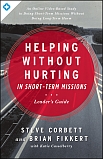
Steve Corbett & Brian Fikkert
Reviewed by: David P. Nakhla
Helping without Hurting in Short-Term Missions: Leader's Guide, by Steve Corbett and Brian Fikkert with Katie Casselberry. Moody Publishers, 2014. Paperback, 256 pages, list price $14.99. Reviewed by David P. Nakhla, OP short-term missions coordinator.
Five years after publishing When Helping Hurts: How to Alleviate Poverty without Hurting the Poor … and Yourself, which has become a must read for those who serve among the impoverished, coauthors Corbett and Fikkert have now applied these principles directly to the field of short-term missions in Helping without Hurting in Short-Term Missions: Leader's Guide. At the outset, the authors make it clear that this is "not an all-encompassing toolbox for running an STM program." Rather, it is intended as a resource for short-term missionaries who will be engaged with people in low-income communities, domestic or foreign.
While anyone planning to do mission work among the poor could benefit from reading this book, it is aimed at STM leaders preparing a team for such a trip. (A companion book, a "Participant's Guide," the text of which is included at the back of the leader's guide, can also be purchased separately.) The first eight chapters of the book present training material, while the final chapter offers suggestions for post-trip reflection on the experience. The book provides access to a number of excellent twenty-minute online videos that offer instruction by Corbett and Fikkert, vignettes, and interviews with organizations that have successfully applied the When Helping Hurts principles, all designed to demonstrate the concepts taught in each chapter.
Corbett and Fikkert do not pull any punches in the early chapters, pointing out the glaring woes of the multibillion-dollar STM industry and describing how it often undercuts the work of the local church and local laborers, treats poor people as projects and not as fellow image-bearers of God, and can lead to a "God-complex" in those who go and dependency in those they seek to serve. The authors state that their goal is "to illustrate that the fundamental assumptions, goals, structure, and methods of STMs as they exist today are setting us up to unintentionally harm materially poor communities and the ministries that work in them."
That said, they emphasize that "trips need to be reformed, not destroyed." They acknowledge that a short-term mission trip that has been properly constructed and oriented around the goals of learning, encouragement, and fellowship can result in healthy engagement between the team and the field.
The chapter most helpful for OPC STM teams to consider might be chapter 4, entitled "Preparing for Complexity: Culture at Work." There the authors explore the different ways in which Westerners and those in other cultures approach such matters as time, directness in interactions, and the role of individuals within communities.
I commend this book as a useful resource to help train STM teams and individuals, particularly those planning to work in lower-income communities and who aspire to help without hurting in short-term missions.
April 27, 2025
The Devoted Mind: Seeking God’s Face in a World of Distraction
April 20, 2025
April 13, 2025
Suffering: God’s Purpose in Our Pain
April 06, 2025
Sunday Matters: 52 Devotionals to Prepare Your Heart for Church
March 30, 2025
On the Trail with a Missionary
March 23, 2025
Midnight Mercies: Walking with God Through Depression in Motherhood
March 16, 2025
© 2025 The Orthodox Presbyterian Church